|
|
|
|
|
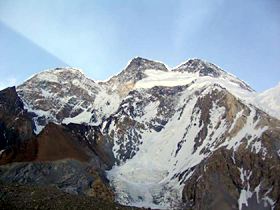
|
BROAD PEAK Killer Mountains an Explorersweb series
14:57 p.m. EDT Aug 28, 2003
In ExplorersWeb's new series we investigate messages hidden
in unique statistics compiled by AdventureStats. We look at fatality rates
for the 14 8000+ mountains, starting with the dreaded Karakorum/Pakistan
giants.
But we are not stopping there. We compare modern and old fatality statistics,
trying to determine the effects of the arrival of commercial expeditions
in 1990s. AdventureStats is providing the underlying research and later,
will also look into the causes of deaths.
Today, Everest has hosted close to 2000 successful summits. 179 people
have perished giving a fatality rate of 9.3% (fatality rate is defined as
successful summits compared to fatalities).
However, since 1990 there has been an explosion of summiteers and fatality
statistics have changed. Up to 1990 the Everest fatality rate is a whopping
37%, yet from 1990 until today the rate has dropped to 4.4%.
So how does that compare to the rest of the 8000+ peaks? Let's check it out.
First out is Broad Peak (8051 m)
Named for its great expanse and bulk, the triple crested Broad Peak was
scaled for the first time on June 9, 1957 by Hermann Buhl, Kurt Diemberger,
Marcus Schmuck and Fritz Wintersteller.
With a route considered less technically challenging, Broad Peak has
a reputation of being among the easiest of the 8000 meter peaks. But statistics
are signaling a more dangerous mountain than its reputation.
A mere 255 climbers have summited Broad Peak and 18 have died. The overall
fatality rate is thus 7%, pretty close to Everest overall fatality rate of
9%.
Interesting enough however, comparing statistics gives at hand that Broad
Peak has become more dangerous to climb! Up to 1990 the Broad Peak fatality
rate is 5%, but from 1990 until today 12 out of 140 climbers have died -
the rate jumping to 8.6 %, or close to twice of the modern Everest fatality
rate (4.4%).
Whilst the old Everest risk was 37% and BP only 5%, the giants now have
switched places with Everest on 4.4% and BP on 8.6% in the last decade. In
a later follow up, we will look at the causes, but the facts are an early
indication to climbers not to take Broad Peak lightly.
At 8,051m, Broad Peak is number 12 on the list of the fourteen 8,000m
peaks, and is the third highest in the Karakoram range. It is located in
Pakistan on the upper reaches of the Baltoro glacier, the main access route
to the mountains which cuts through the center of the Karakoram range.
The Karakoram is the second tallest mountain range on earth. It lies
about a thousand miles west of Nepal's Himalaya mountain range, and extends
nearly 300 miles (480 kilometers) southeastward from eastern Afghanistan.
The range is bordered by Tajikistan, China, Pakistan, Afghanistan, and
India. It is a condensed cluster of high peaks with 60 mountains over 23,000
feet.
Of the world's fourteen highest mountains, four are located in within
the Karakoram range: K2, Gasherbrum I and II, and Broad Peak. K2 is tallest
in the Karakoram range and her three 8000m neighbors lie within 20 km.
This season, several climbers reached the summit of Broad Peak, but not without escaping dangerous consequences.
Dennis Urubko and Ed Viesturs carried out a nighttime rescue of Jean-Christophe
Lafaille when he suffered from pulmonary problems after summiting and could
not descend on his own.
It was Viesturs second trip to Broad Peak. In 1997, he reached its Rocky
foresummit - 23 meters below but half a km away from the main summit. Those
last few meters on Broad Peak are often the most treacherous and toughest
to surmount.
With an overall fatality rate of 7% and modern fatality rate increased
to 8,6%, Broad Peak is statistically more dangerous than Everest today.
Image of Broad Peak's triple crest courtesy of RussianClimb.com.
|
|
|
|
|
|
| |
|
Top Feature Stories
|
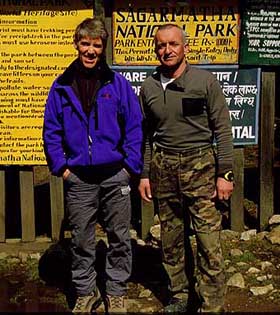 |
Vladimir Suviga: one in the team
Full Story
|
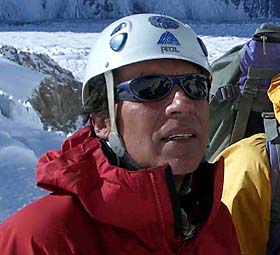 |
Oscar Cadiach: following Mallory's trail
Full Story
|
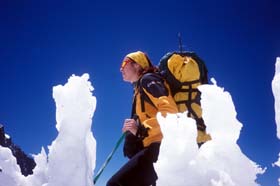 |
ExWeb tribute to the Women of K2 - Edurne's overstuffed backpack
Full Story
|
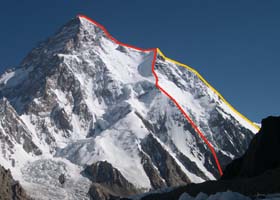 |
K2 Plan B: The Cesen Route
Full Story
|
|
|
|
|

|
